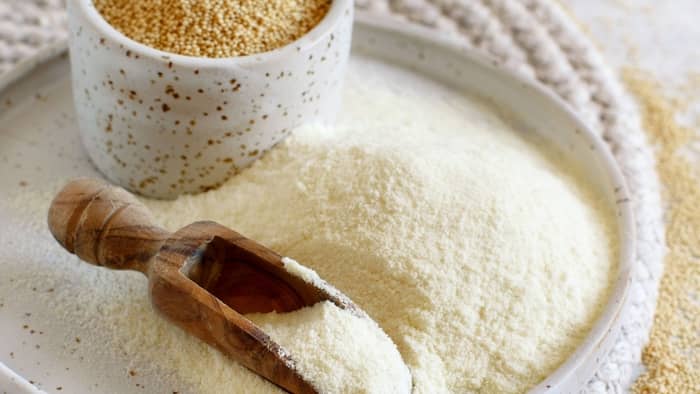Last Updated on April 1, 2022
Today, we’re going to be answering the question: is spelt bread gluten free? And taking a look at some spelt flour gluten-free substitutes. There’s been a debate for many years over whether spelt is safe to eat on a gluten-free diet, and it’s a tricky one to navigate – but we’ll be taking a deep dive into it all today.
What Is Spelt?
First, let’s take a look at what spelt actually is! Before I received my diagnosis, I hadn’t even heard of spelt, but once I did my research, I found that I’d likely eaten spelt on many occasions! But to put it simply, spelt is a type of grain. It’s a type of wheat and does contain gluten. Spelt has been around for over 7,000 years and can be used in a variety of cooking and baking.
Learn more about: Is Rye Whiskey Gluten-Free? (GF Alcoholic Drinks)
You can use spelt for:
- breads
- pastries
- cookies
- risotto
- salads
- cereals
- soups
Is Spelt An Ancient Grain?
Yes. This is where things often become confusing, as we’re led to believe that spelt is indeed an ancient grain. Other ancient grains that you may be familiar with are amaranth, millet, quinoa, sorghum and even buckwheat – all of which are gluten-free. However, spelt isn’t part of the “ancient grains” because it’s gluten-free. It’s an ancient grain, simply because it’s a form of ancient wheat.
Why Is Spelt Different?
Spelt is different for a number of reasons. The main one being that it’s not bred to have a higher gluten content like grains such as wheat. As wheat is so mass-produced, there’s a need for a higher volume of gluten – whereas spelt is usually used in its most natural form.
This is where things are about to get Science-y! In wheat, the Omega Gliadin levels are much higher than in spelt. There is also an Omega Gliadin called Omega-5 Gliadin, which is strongly antigenic – and spelt does not contain this, whereas wheat does.
Also, spelt is low in FODMAPs, and wheat is not. Following a low FODMAP diet is great for preventing GI symptoms. It’s also worth noting that spelt contains half the gluten that modern wheat does! Although the symptoms may not be as severe, it does still contain gluten and can be harmful to your body, particularly if you have celiac disease.
Spelt Flour Gluten Free Substitutes
While you may want to opt for spelt flour, instead of other gluten-free flours, it’s best not to. Although it may feel frustrating, there are plenty of other gluten-free substitutes to spelt you may want to try instead. Many of which also fall under the “ancient grains” category and are actually very similar to spelt.
Amaranth is by far the best choice to opt for if you’re looking for the closest substitute. It’s an ancient grain and very similar to spelt (but gluten-free!). You can often find amaranth in flour or grain form, meaning it’s versatile and can be used for a range of cooking and baking recipes. Amaranth is particularly delicious in soups and stews.

Read more about: Namaste Perfect Flour Blend Recipes
Some other flavorful grains that often come in grain and flour form are:
- buckwheat (despite the name, it is gluten-free)
- tapioca
- quinoa
- millet
- sorghum
- rice
There are plenty of varieties to try out in your cooking, so find what’s best for you. They all have slightly different flavours and textures, so feel free to experiment!
Which Grains Contain Gluten?
When I first received my diagnosis, I felt completely overwhelmed. How do I know what to look out for? Which grains are the ones that contain gluten? My dietician gave me this simple acronym and it’s made shopping a hell of a lot easier for me! Just remember BROWS.
Barley
Rye
Oats (unless GF oats)
Wheat
Spelt
You can find out more about this handy acronym here.
Conclusion
I hope this article has helped to answer the question: is spelt bread gluten-free? And give you a few alternatives to spelt flour if you’re unsure how to replace it in your diet. Luckily, spelt isn’t too common nowadays, so it won’t be too difficult to avoid. However, no matter how tempting it may be – it’s always best to avoid any form of gluten, including spelt.
Do you know of any other gluten-free substitutes for spelt flour? Or have you tried spelt since becoming gluten-free? I would love to hear of your experiences with spelt since starting a gluten-free diet. Feel free to let me know in the comments below. Sharing is caring!
FAQs
Is Spelt Bread OK For Gluten Intolerance?
Despite the myth that spelt bread and flour is okay for gluten intolerance - this is definitely not the case. While it may be known to cause fewer reactions than grains like wheat or rye, it's not recommended to consume spelt when following a gluten free diet. Scientists have done extensive testing on this and have found that those with celiac disease and gluten intolerance will react to spelt.
Is Spelt Bread Lower in Gluten?
Interestingly enough, the answer to this is yes. This is why the question of whether spelt is safe to consume on a gluten free diet is such a hot topic! Spelt has lower gluten wheat because the molecular structure is slightly different. It's easier to digest than wheat we see in foods nowadays, which is why you may find the reaction may not be as severe as when consuming wheat. Also, modern wheat is made to have a higher gluten ratio, unlike spelt.
Why Can I Eat Spelt But Not Wheat?
You may find that you can tolerate spelt better than wheat. This may be because you have a separate wheat intolerance, as opposed to being intolerant to all gluten. Or it may be because there's simply less gluten in spelt. As spelt is easier to digest, it's less likely to cause gut issues or trigger severe symptoms. However, it's still not recommended you eat spelt when following a gluten free diet.

Hi, my name’s Zoë. I’m 28 years old and live in London, UK. I work full time as a freelance writer and critic for West End theatre. Writing has been a passion of mine for as long as I can remember. I spend most of my free time at the theatre, or at conventions. I’m married to the love of my life, and live in a small apartment with my fur baby, Lillie. I run two of my own blogs: No Safer Place and Stage to Page: both of which have won awards. I also have a YouTube channel where I talk about all things stagey.
